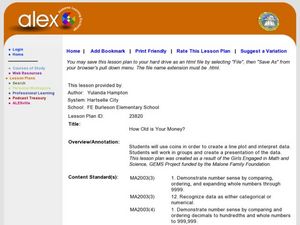Curated OER
How to Use Expanded Form
Third graders write numbers in expanded form. In this math vocabulary lesson, 3rd graders write numbers in expanded form using words only, words and numbers, and numbers only. Each student is given three dice to roll. They then write the...
Curated OER
Jack and The Beanstalk Estimation
Introduce the day's lesson by reading Jack and The Beanstalk by Richard Walker, and then review the concept of area with your class. We don't always need rulers to measure, though! Teach learners how to use their hands to help us measure...
Curated OER
My Foot and the Standard Foot
Young mathematicians put one foot in front of the other as they learn how to measure length in an elementary math lesson. Using paper cutouts of their own feet, children measure classroom objects as they discover the importance of...
Curated OER
Flicking Football Fun
Young mathematicians fold and flick their way to a deeper understanding of statistics with a fun, hands-on math unit. Over the course of four lessons, students use paper footballs to generate data as they learn how to create line...
Roald Dahl
Matilda - Arithmetic
Mr. Wormwood, one of the characters in Roald Dahl's Matilda, is not the most trustworthy of characters. Have student groups take on the roles of car salespeople and play a game to see who can make the most profit by selling...
Shmoop
Coordinate Proofs
How do you know you know? Prove it! The guide goes through several examples and includes a link to a video to teach learners how to work through coordinate proofs. The goal is to prove that different shapes are indeed that shape.
Worksheet Web
Learning About Rate
After reading a one-page passage on how to understand and solve distance/rate problems, young mathematicians answer six word problems that have them correctly set up the formula in order to solve for the distnace, rate, or time in the...
Alabama Learning Exchange
How Old is Your Money?
Elementary learners explore coin mint dates. First, they listen to the book Alexander Who Used to be Rich Last Sunday by Judith Viorst. They then sort a collection of coins according to their mint date and put them in order from oldest...
West Contra Costa Unified School District
Lowest Common Multiple through the Grades
The LCM will be your new BFF. Learners review least common multiple and least common denominator applications, mostly on fractions, from middle school. Scholars then see how the LCM can be applied to various types of problems from...
Granite School District
Vocabulary Cards 1st Grade A-L
Help young mathematicians acquire key vocabulary with this printable resource. Three different cards are provided for each word; one with only the word, one with the word and a picture, and one with the word, a picture, and a definition....
Granite School District
Vocabulary Cards 1st Grade M-Z
Clarify key math vocabulary terms with this series of printable cards. Three different versions of each term are provided; one with only the word, one with the word and a picture, and one with the word, a picture, and a definition. Note...
Curated OER
Math Handbook: Calculus
If only there was a reference that listed all the formulas covered in calculus. Luckily, there is. This comprehensive 197-page handbook provides formulas and explanations for all topics in AP Calculus or in a standard college calculus...
Curated OER
Real-Life Problems
Choose your operation; scholars read five math-application word problems and determine which of four operations to use in solving each. They work with time and measurements, making sure to include the proper units in their solutions....
Curated OER
A Look At Rocks
Learners write letters to organizations, such as United States Geological Society, to find out more about rocks. Students write about a pretend time they found a magic pebble. Learners calculate distances to travel to see various...
Curated OER
Welcome to My World!
Students use maps to locate information. They read the story, "It Looked Like Spilt Milk", view images of the continents and discuss the various continents. Afterward, they make their own Atlas to record information that they can later...
Noyce Foundation
Ducklings
The class gets their mean and median all in a row with an assessment task that uses a population of ducklings to work with data displays and measures of central tendency. Pupils create a frequency chart and calculate the mean and median....
Curated OER
Rooster's Off To See the World Number-Sense
Students recognize how numbers are used in number stories. In this Rooster's Off To See the World lesson plan, students participate in the story. Students complete a number activity and work on the computer to illustrate a number...
Curated OER
Inequalities and The Order of Operations
Middle and high schoolers investigate how to solve inequalities. The lesson has a good guide for taking pupils through a direct instruction of the concept. You can use counting tiles in order to help kinesthetic learners.
Curated OER
Sorting
A lesson plan on classification and sorting is here for you. Elementary schoolers participate in an interactive computer game in which they sort books by theme. They take a trip to the library to observe and discuss how books are sorted,...
Curated OER
Quarters, Dimes, and Nickels
Second graders add and subtract coins, decide which coins to use to purchase an item, and compare values of sets of coins.
Pennsylvania Department of Education
Counting Numbers: Four
Young scholars practice counting to four. In this counting to four lesson, students access an e-book at "I Save A Tree.com" where they count items up to four. They examine the text and images which can be seen in both Spanish and English.
Curated OER
Solving Inequalities By Using Addition And Subtraction
Seventh graders solve inequalities using addition and subtraction. They write number sentences based on word problems.
Curated OER
Use a Bar Graph
In this bar graph learning exercise, students use a given bar graph to answer a set of 3 questions. Answers included on page 2.A reference web site is given for additional activities.
Curated OER
Decimal Fractions
Students use rounding and compensating with whole numbers and explain how to use the empty number line to show additions and subtractions. They round and compensate in relation to decimal subtraction
Background























